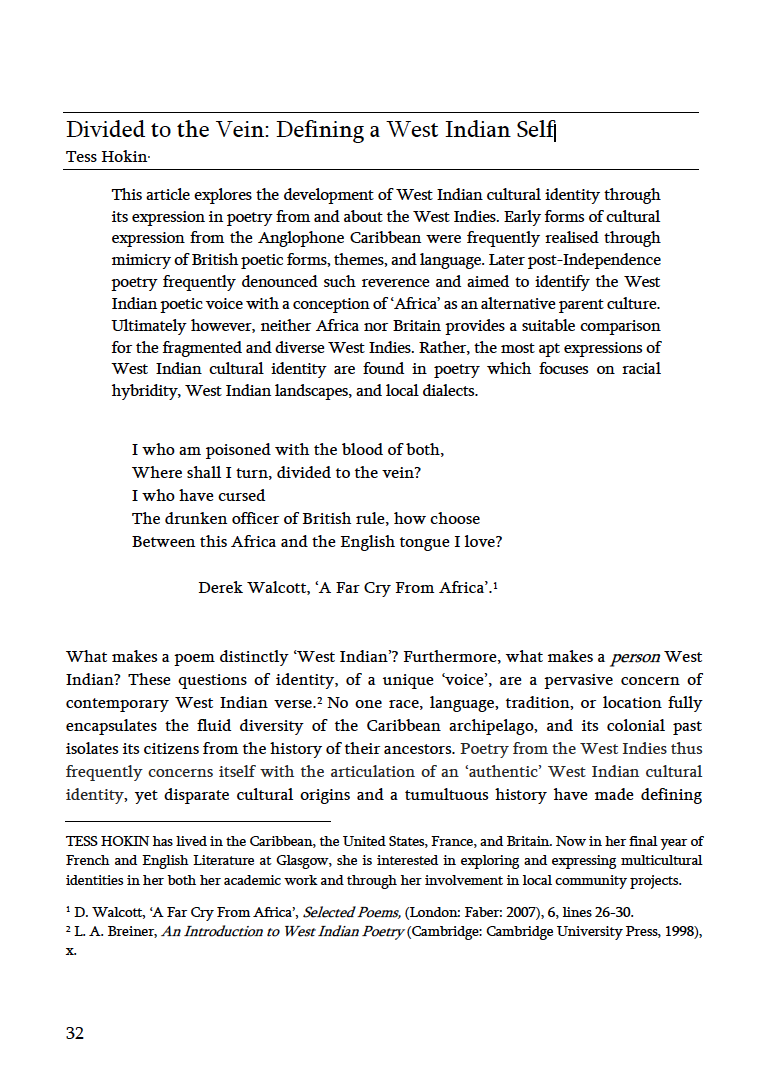Divided to the Vein
Defining a West Indian Self
DOI:
https://doi.org/10.36399/GroundingsUG.9.196Keywords:
West Indies, Cultural Identity, Caribbean, Poetry, Landscapes, DialectAbstract
This article explores the development of West Indian cultural identity through its expression in poetry from and about the West Indies. Early forms of cultural expression from the Anglophone Caribbean were frequently realised through mimicry of British poetic forms, themes, and language. Later post-Independence poetry frequently denounced such reverence and aimed to identify the West Indian poetic voice with a conception of ‘Africa’ as an alternative parent culture. Ultimately however, neither Africa nor Britain provides a suitable comparison for the fragmented and diverse West Indies. Rather, the most apt expressions of West Indian cultural identity are found in poetry which focuses on racial hybridity, West Indian landscapes, and local dialects.
References
Anonymous, ‘“Africa” in West Indian Poetry’, (January 1955) 4:1 Caribbean Quarterly, (January 1955), 5-13.
L. Bennett, ‘Back to Africa’ in The Penguin Book of Caribbean Verse in English ed. Paula Burnett, (London: Penguin, 1986).
K. Brathwaite, ‘Caribbean Writing Today’, (1978) 2:3 NAM Speaks.
K. Brathwaite, History of the Voice: The Development of Nation Language in Anglophone Caribbean Poetry, (London: New Beacon, 1984).
K. Brathwaite, The Development of Creole Society in Jamaica, (Oxford: Clarendon Press, 1971).
L. A.Breiner, An Introduction to West Indian Poetry, (Cambridge: Cambridge University Press, 1998).
W. Brown, ‘The Poetry of the Forties, Part II’, Trinidad Guardian, (Sept. 20, 1970).
P. Burnett, ‘Introduction’, The Penguin Book of Caribbean Verse in English ed. Paula Burnett, (London: Penguin, 1986).
C. Campbell, ‘Folking Up the Criticism’ in The Routledge Companion ed. M. A. Bucknor and A. Donnell (Oxford: Routledge, 2011), 382-392.
H. D. Carberry, ‘Nature’ in Caribbean Voices, ed. John Figueroa (London: Evans Brothers, 1971).
S. P. Casteel, ‘The Language of Landscape’ in The Routledge Companion to Anglophone Caribbean Literature, ed. M. A. Bucknor and A. Donnell (Oxon: Routledge, 2011), 480-489.
H. G. Clerk, ‘Ode to the Jamaican Mocking Bird’, in Voices from Summerland, ed. J. E. C. McFarlane (London: Fowler Wright, 1929), 62-67.
F. Fanon, Black Skin, White Masks, trans. C. L. Markmann, (New York: Grove Press, Inc., 1967).
A. compte de Gobineau, ‘Essai Sur l’Inegalité des Races Humaines’ (Paris : Firmin Didot Frères, 1853-1855).
C.L.R. James, The Black Jacobins (New York: Vintage, 1963).
B. King, ‘Introduction’, West Indian Literature, ed. Bruce King, (London: Macmillan, 1979).
G. Lamming, The Pleasures of Exile, 3rd. edition, (Ann Arbor, Michigan: University of Michigan Press,1992).
M. Morris, ‘On Reading Louise Bennett, Seriously’, (Dec. 1967) Jamaica Journal, 69-74.
A. S. Rush, Bonds of Empire: West Indians and Britishness from Victoria to Decolonization (Oxford: Oxford, 2011).
B. Smith, ‘Tom Tom’ in Breaklight, ed. Andrew Salkey (New York: Anchor Books, 1973).
D. Walcott, ‘A Far Cry From Africa’, Selected Poems, (London: Faber: 2007).
D. Walcott, ‘Some Jamaican Poets’, (03 August 1957) Public Opinion.
D.Walcott, Tiepolo’s Hound (New York: Farrar, Straus, and Giroux, 2000).
E. Wallace, ‘The West Indies Federation: Decline and Fall’, (1962) 17.2 International Journal, 269-288.
D. Williams, ‘We who do not know the snow’ in Caribbean Voices, ed. John Figueroa (London: Evans Brothers, 1971).
W. Wordsworth, ‘Preface to the Lyrical Ballads’ in Wordsworth’s Preface to Lyrical Ballads, ed. W. J. B Owen,(Copenhagen: Rosenkilde and Bagger, 1957), 112-133.
S. Yoshikawa, William Wordsworth and the Invention of Tourism, 1820-1900, (Farnham, Surrey: Ashgate, 2014).

Published
Issue
Section
License
Copyright (c) 2016 Tess Hokin

This work is licensed under a Creative Commons Attribution 4.0 International License.
The CC BY 4.0 license is a Creative Commons license. This is a non-copyleft free license that is good for art and entertainment works, and educational works. It is compatible with all versions of the GNU GPL; however, like all CC licenses, it should not be used on software. People are free to: Share — copy and redistribute the material in any medium or format; Adapt — remix, transform, and build upon the material for any purpose, even commercially. The licensor cannot revoke these freedoms as long as you follow the license terms. But they must conform to the following terms: Attribution — You must give appropriate credit, provide a link to the license, and indicate if changes were made. You may do so in any reasonable manner, but not in any way that suggests the licensor endorses you or your use. No additional restrictions — You may not apply legal terms or technological measures that legally restrict others from doing anything the license permits.
Please check individual article PDF copies to see if any additional restrictions apply.







